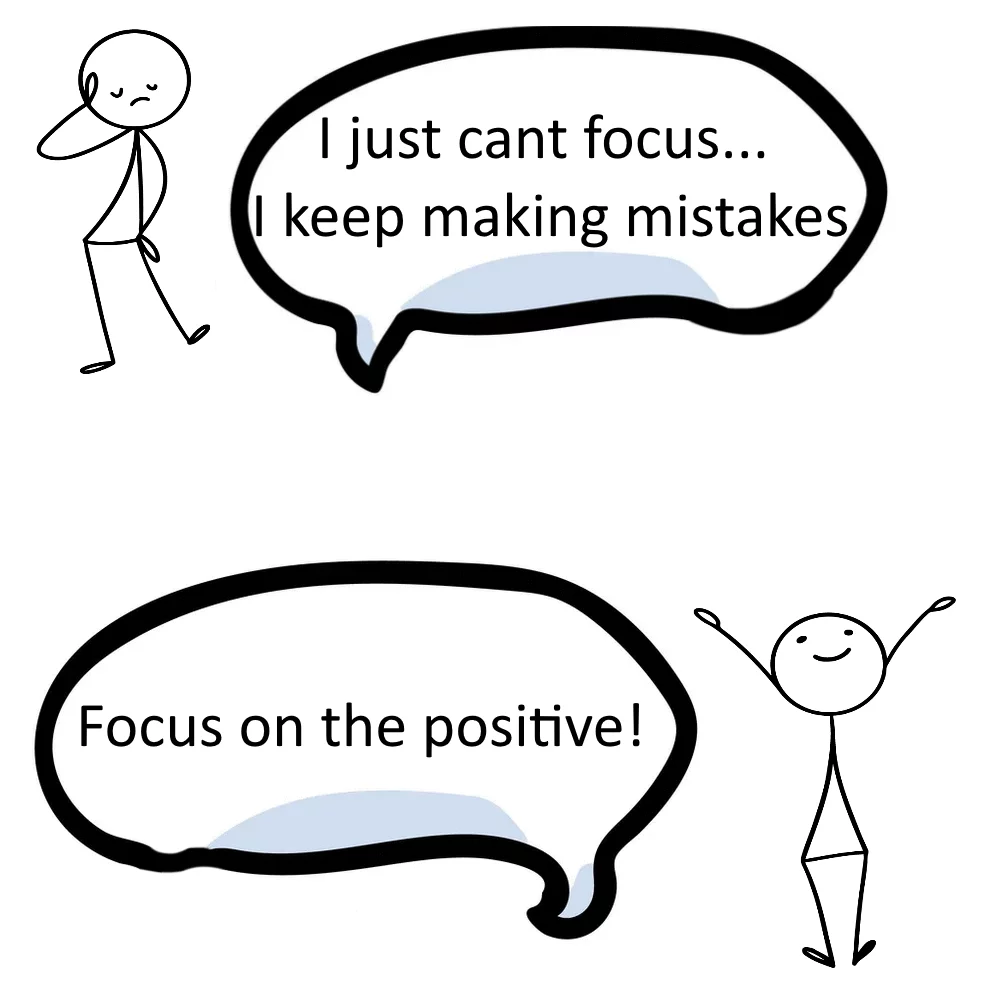
Resilience: The Power Of Positive Thinking

This does not mean ignoring the bad things. It means that you accept the bad, but then start working on making the most out of whatever has happened.
Positive thinking allows you to approach life’s challenges with positivity and optimism.
When bad things happen, you focus on the positive and keep going rather than focusing on the bad. For many people, this is the definition of resilience.
Learning to be more positive is a big step towards learning to be more resilient.
Your thoughts make your actions, and your actions define your success.
Developing a positive mindset will make you far more resilient and happy.
The Benefits Of Positive Thinking
You cannot change the world outside, but you can change how you react to it.
Changing how you react to the world will change how you feel about yourself, and so has a real impact on your well-being.
The benefits of positive thinking go far beyond just feeling good at the moment. Being positive also goes hand in hand with self confidence.
It offers a whole host of benefits, a key one being stress management and building resilience. These benefits have been extensively researched.
The physical benefits include:
-
- Increased life span
- Better psychological and physical well-being
- Better cardiovascular health
- Reduced risk of death from cardiovascular disease
- Positive Attitude
- Positive people around
- More pain tolerance
The mental benefits include:
-
- Increase in creativity
- Greater problem-solving skill
- Clear and realistic thinking
- Better mood
- Lower rates of depression
- More resilience against stress
- Increase in confidence
- Better time management
How Does Positive Thinking Work?
Positive thinking allows you to approach difficulties more productively and to take action.
The ability to keep moving and focus on the positive offers two clear benefits:
- You avoid getting stuck in a negative cycle of doubting yourself and blaming yourself. This only eats away at your self-confidence and makes you less likely to take action.
- Taking action feels good and often makes problems feel more manageable. This makes you more likely to persevere as your problems seem more manageable and so puts you into a virtuous circle.
Can Positive Thinking Change Your Brain?
There is some evidence that positive thinking can change your brain.
Positive thoughts will reduce your cortisol levels and increase your serotonin levels.
These in turn can change which genes are expressed in your brain.
This isn’t well researched so we wouldn’t blame you if you take this with a grain of salt.
However, it is widely accepted that London cab drivers physically change the structure of their brain during their training when they learn their way around London’s roads. So perhaps it wouldn’t be surprising if consistently thinking positively also changed your brain.
Want to know how resilience is effecting the average person in the UK? Read our resilience statistics here!
How Do I Know If I’m A Positive Thinker?
“There is nothing either good or bad, but thinking makes it so.” (William Shakespeare)
Positive thinking is a skill that can be learned and developed.
The following are fours signs that you are probably a positive thinker.
1 – Lifting Yourself With Positive Self-Talk
Positive thinkers lift themselves with positive self-talk.
They turn negative statements into actionable, motivational, and uplifting statements.
Positive thinkers are sometimes going to have negative self-talk, but they are aware of it and refocus themselves.
2 – Makes Everyone Happy
Studies have shown that happiness and positivity is contagious.
Positive people have a way of making others feel happy too. They bring out the best in other people.
If you find you are surrounded by positive people, you are probably a positive thinker.

3- Acknowledge The Negative, But Not For Too Long
Positive thinkers don’t ignore the negative, they live in the real world. Positive thinkers realize the negative, but then react positively and proactively. They don’t dwell on negative thoughts.
If you find that you don’t tend to dwell on the negative, and move towards positive thoughts, then you are probably a positive thinker.
4- Focus On The Good
Positive thinkers recognize both the positive side and the negative, but choose to focus their time and energy on the side that’s going to move things forward.
They respond to negativity with positivity and hope.
Examples Of Positive Thinking
Is the glass half full or empty?
Both. It depends on how you look at it.
If you focus more on the empty part of the glass, it will bring stress and demotivation. However, looking at the full side and working to make the empty part of the glass full will bring results, reduce stress, and eliminates negativity. It is a great example of the power of positive thinking.
Look at failures and negative events as an opportunity to grow.
Stuck in traffic, it’s the best time to listen to an audiobook.
Missed a bus to the next street, take a walk.
When Thomas Edison’s factory was burning down. He didn’t bemoan the disaster.
He famously sent messages to his relatives encouraging them to come and see the fire as they’d never see anything like it again!
Positive thinking is also an important factor in gratitude, read more on the benefits of gratitude here.
Famous Positive Thinkers
Countless celebrities believe their success results from positive thinking.
Examples include:
1- Jim Carrey
Jim Carrey, a huge Hollywood star, and imagined his success long before he was successful. He has always had great faith in himself.
2- Jennifer Lopez
Jennifer Lopez’s day is not finished without 15 minutes of affirmations and positive thinking.
She believes positive thinking helps her build resilience against stress.
3- Denzel Washington
In order to change your life, you must change your thoughts. (Denzel Washington)
Denzel Washington uses affirmations and positive thinking to build a positive mindset, which made him successful.
4- Oprah Winfrey
From poverty to the world’s wealthiest women, Oprah Winfrey believes her success results from a positive mindset.
She believes her success was not possible without affirmations and positive thinking.
Positive thinking can help you in all walks of life! It can even help when combating imposter syndrome.
8 Ways To Develop Positive Thinking
Positive thinking is a mindset that can be developed.
Here are 8 great ways to banish negative self-talk, think positive, and start enjoying the power of positive thinking.
1- Start The Day With A Positive Affirmation
Affirmations are positive sentences that you listen to or say yourself repetitively.
The idea is that affirmations help to reprogram your mind. So, in this case, you can use them to help you to think more positively.
Researchers have shown that spending just a few minutes thinking about your best qualities before a high-pressure meeting can calm your nerves, increase your confidence, and improve your chances of a successful outcome.
Starting your day by repeating and focusing on positive phrases will help you to get into and keep a positive outlook.
It will also mean that when inevitable setbacks come, you’ll react fact less and so be mentally tougher.
2- Smile More & Laugh More
Find humour in everyday events. Smile more, especially during hard times.
Smiling and laughter reduce stress and bring positive energy, emotions, and thoughts.
In a study, people who smiled (even fake-smiled) while doing a stressful task felt more positive during and after the task than those who were at neutral expression.
Laughter has been shown to provide a wealth of health benefits and to make you feel more optimistic.
Spend time with people who make you laugh.
3- Learn From Failures
Success consists of going from failure to failure without the loss of enthusiasm. (Winston Churchill)
Failures are part of life. If you don’t fail, you don’t learn. If you don’t learn, you never grow.
Remember, failures bring opportunities.
Accept mistakes and turn your failure into a lesson. Make the most of it by thinking about it and writing down all the lessons that you can take from the failure.
Then remind yourself that failure also brings other opportunities, and move forward.
4- Practice Positive Self-Talk
Studies show that positive self-talk increases confidence and reduces stress.
Replace negative words with positive ones. Use words that make you feel happy, strong, confident, and motivated.
If negative thoughts enter your mind, catch yourself and respond with positive affirmations.
5- Focus On Your Strengths
Whatever you think and focus on, you become. (Law Of Attraction)
Identify your strengths and focus on them.
People who focus on their strengths are happier, healthy, confident, and motivated. They feel less stressed, have more positive energy, and experiences faster growth.
6- Surround Yourself With Positive People
“Surround yourself with those who only lift you higher. (Oprah Winfrey)
You are the average of the five people you spend the most time with. So choose your friends carefully.
Your friends create your surrounding. Positive people make your mood, inspire you, and help you to make better decisions.
7- Maintain A Healthy Lifestyle
Getting 30 minutes of physical activity each day can help in positive thinking.
All exercise helps, whether it’s walking, biking, or going to the gym.
Regular exercise makes you happier, relaxed, less stressed, and increases positive energy. Follow a healthy diet to feed your mind and body.

8- Practice Gratitude
Focus on the good things, no matter how small they are.
A study found that people who kept gratitude journals felt more thankful, positive, and optimistic about their future. They also slept better.
Noticing and appreciating the positives in our lives is a great way to increase positive thinking and build resilience against stress.
Start to practice gratitude by taking 5 minutes to think of 3 things to be thankful for no mater how small or insignificant.
Conclusion
Positive thinking does not mean ignoring the negative. It means approaching the negative situations with hope and productivity.
Positive thinking is a learned skill. This means that anyone can learn it and everyone can improve theirs.
If you think positively, then it helps in all aspects of everyday life. It improves your mental health and reduces your negative thoughts. It is one of the coping skills that all truly resilient people have.
Looking for more tips on Resilience? Read our article on the relationship between resilience and stress here!
Image credit: Pexels


